The Story of Rama
I gave you an overview of the ten Avatars of Vishnu and also narrated how Jayan and Vijayan, the two doorkeepers of the Lord’s Abode in heaven, chose the option of three births as villains rather than ten births as virtuous men. I explained that Jayan and Vijayan felt that this way, they would return faster to the Lord. By virtue of the option they chose, in the Sathya Yuga they took birth as the two demons Hiranyaksha and Hiranyakashyapu, and how they were duly annihilated by the Lord, incarnating respectively as Varaha Avatar and the Narasimha Avatar.
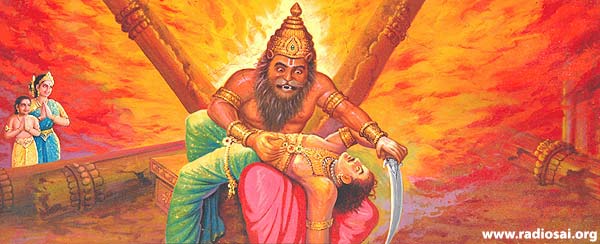 |
| Lord Narashimha Avatar to save Prahalada |
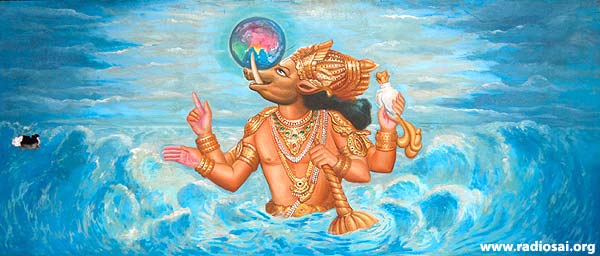 |
| Lord Varaha to rescue Mother Earth |
The Treta Yuga had set in, and it was time for Jayan and Vijayan to be born again, which they did as the demonic brothers Ravana and Kumbhakarna, belonging to the clan of the Rakshasas (demons). Propitiating Brahma with intense penance or Tapas, Ravana gained the boon of freedom from death by Devas, Asuras, Rakshasas (angels, demons, etc.). Curiously he omitted humans from his list of exemptions, feeling perhaps that humans were too weak to represent any danger - it was, of course, the Lord's play in leaving a loophole for Himself!
Being evil by nature, Ravana was in no mood to use the various powers gained by penance for doing good; instead, he went on an attacking spree and soon became a much-feared ruler. Unable to bear the harassment he inflicted on the three worlds, the Devas or the demi-gods approached Lord Narayana for protection. Yielding to their pleas, Narayana decided to stir out again from His abode, Vaikuntam. Unlike earlier when His incarnations were brief and highly goal-oriented, this time His visit to earth would be more leisurely. He would descend in human form, indeed as the perfect man; and His agenda would be larger than merely getting rid off Jayan and Vijayan, now born as demons.
| |  |
| The King is blessed with the Divine Pudding | |
The Divinely Auspicious Birth
When incarnating, the Lord always chooses the time and place to suit His purpose. This time He chose to be born as the son of Emperor Dasaratha of Ayodhya. Dasaratha belonged to the Ikshvaku clan, descended directly from the Sun. A good monarch loved by all, Dasaratha had everything a king could possibly desire, except progeny. On the advice of his preceptor, Sage Vasishta, Dasaratha decided to perform a special ceremonial sacrifice or Yajna that would confer progeny.
As the religious rites wound to a climax, there emerged from the sacred fire to which oblations were being offered, a form carrying a golden vessel. Addressing Dasaratha, the form said, "Sire, I bring from Brahma His blessings to you and offer the sacred Payasam (sweet pudding) in this vessel as Prasadam. Kindly distribute this to your wives; they will soon present you with sons". Dasaratha did as instructed, and in due course, four sons were born to his three wives, Rama to the eldest wife Kausalya, Lakshmana and Shatrugna to the second wife Sumitra, and Bharatha to the third wife Kaikeyi.
Following the happy event, everyone was deliriously happy, from the Emperor down to the common people. The Princes were most charming and loved by all, Rama, the eldest especially. Among the brothers, Lakshmana formed a special bond to Rama, and likewise Bharatha and Shatrugna had special attachment for each other. However, it was not as if there were two groups; they all loved each other immensely, and the younger ones without exception were devoted to Rama beyond words.
A Sagacious Request
One day when the Princes were in their teens, Sage Viswamitra, famed for his rigorous penances, arrived at the court of Dasaratha and was received with all due honours and courtesy. After the initial welcome and greetings were over, Dasaratha respectfully inquired how he could be of service to the venerable sage; Viswamitra had only to command and Dasaratha would immediately obey and execute the order. Pleased with the offer, Viswamitra said, "O King, I am in the midst of performing some important Yajnas (austerities) in my hermitage, Siddhashram. Unfortunately, I am being severely obstructed by several demons, Subahu and Maricha, in particular. I believe they can be held at bay by your sons, Rama and Lakshmana. Please send them with me and help me to complete the rituals."
Dasaratha was stunned and his head reeled. Barely finding his voice, he replied, "O venerable Sage, it is only appropriate that you seek protection for your Yajna. I offer you my entire army for the purpose. Indeed, I shall personally come and supervise the protection. What can two young lads do compared to an army? I beg of you to spare them". Viswamitra shook his head and said, "Dasaratha, neither you nor your army would be necessary; Rama and Lakshmana alone are sufficient". Hesitantly, Dasaratha again ventured, "But O Sage, the Princes are mere teenagers! Please allow me to substitute for them." Viswamitra replied, "I appreciate your anxiety, but have no fear, for Rama is none other than the Lord Himself and Lakshmana is Adishesha personified (Adishesha is the thousand-headed serpent on which Narayana rests while in His heavenly abode Vaikuntam). But Dasaratha would not listen and again offered arguments to claim that Rama and Lakshmana were inadequate for the task ahead.
Viswamitra now became angry and raising his voice said, "Dasaratha, I thought you were a man of honour who never went back on his word. You promised to do whatever I wanted, but when I actually asked, you are beginning to retract. You are a disgrace to the illustrious Ikshvaku clan". Seeing that matters were getting a bit out of hand, Sage Vasishta intervened and persuaded Dasaratha to stand by his word. Eventually, Viswamitra departed, with the two young Princes in tow.
Rama's Role - Defending the Righteous
Viswamitra had accumulated so much power through his penance (Tapas), that he could well have reduced to ashes the demons who were bothering him; but he chose not to. Instead, conscious of the Lord's game plan he was content to play a secondary role. The Lord had descended to destroy Ravana and there was an elaborate preamble to that which could not be short-circuited.
Although Viswamitra knew fully well who Rama really was, Rama kept up the pretence of being an ordinary Prince and plied the sage with various questions while they were making the journey to the Sage's hermitage. The sage smiled and said to himself: "Here is the Lord who knows everything and yet asks me questions as though He knows nothing. Well, I suppose I must keep up the charade." Thinking thus, Viswamitra narrated many a tale including one about how he himself was transformed from a king to a sage. (In passing it may be mentioned that Swami has remarked: Man knows nothing and yet acts as though he knows everything, whereas God knows everything but pretends He knows nothing!)
By the time the party reached Siddhashrama, it became dark and the demons in the neighbourhood came out for their prowls making hideous noises. Viswamitra suddenly became worried. "My God!” he said to himself, "Here are the demons out to do no good and I have these two tender young Princes with me. What if evil befalls them?" Thinking thus, he taught Rama and Lakshmana some special Mantras which would serve as protection.
| | 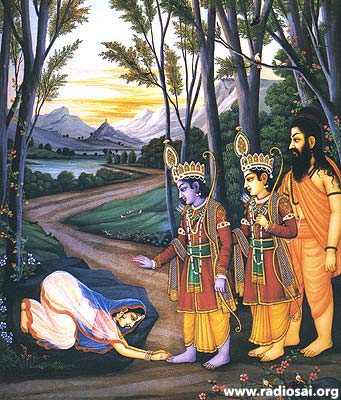 |
| Ahalya is redeemed at the Lotus Feet of Lord Rama |
Swami says that Viswamitra was a Wise One (Jnani) which was why he was able to see the Lord in Rama when he first saw Him in Dasaratha's court. And yet his Knowledge (Jnana) was apparently somewhat clouded because he now thought of Rama as a mere Prince who needed protection! If a supremely wise sage like Viswamitra himself was subject to Ajnana (ignorance), then what to speak of lesser mortals!
Soon after their arrival at the hermitage, Viswamitra commenced his sacrifice or Yajna. As it approached a climax, the demons came in waves to disturb the proceedings, but Rama and Lakshmana made short work of them. In the end, came Subahu and Maricha; while Subahu was killed, Maricha escaped wounded, which, of course, was a part of the Divine plan as Maricha was to play an important role later.
The Yajna successfully concluded; a highly pleased Viswamitra then conducted the Princes to the city of Mithila, the capital of the kingdom of Emperor Janaka. En route, the Sage again narrated many a tale, especially about Rama's ancestors. He also took care to make Rama step on a particular boulder on the way. Once the stone came into contact with Rama's Lotus Feet, it immediately transformed into a lovely woman who introduced herself as Ahalya, the wife of Sage Gautama, cursed to be turned into a stone for unchaste behaviour earlier.
Viswamitra then explained to the Princes why they were headed towards Mithila. Janaka, he said, was a Raja-Rishi, meaning that while Janaka functioned as a king, he ruled with complete detachment, and in that respect, therefore, he was like a Rishi or sage (which, incidentally, is also the reason why Krishna praised Janaka). The Emperor had a foster daughter named Sita (also called Janaki and Mythili). Sita was found as a baby girl in a field by Janaka, and she was really a child of Mother Earth.
Rama Wins the Hand of Sita
Stored in the palace of Janaka was a mighty bow that once belonged to Siva. No one could lift the bow, and yet one day, when she was a young girl, Sita quite effortlessly lifted the box containing the bow, in order to pick up a marble which while playing had rolled under the box. King Janaka was astounded and resolved that when Sita came of age, he would get her married only to a person who could lift the bow of Siva and string it. A contest had now been arranged to select the right person from among the prospective suitors, which was why the Sage was taking the Princes to Mithila.
| |  |
| Lord Rama breaking the invinsible
bow effortlessly | |
Arriving at the court, the party found that the contest was on. One after another the suitors tried to lift the bow, but all of them failed miserably. On a nod from Viswamitra, Rama approached the box, lifted the bow with absolute ease and with equal nonchalance strung it. A delighted Sita garlanded Rama signalling her willingness to wed Him. Janaka was overjoyed, but Rama made it clear that He would not marry without parental consent. Riders were therefore sent post-haste to Ayodhya to give Dasaratha the happy news and to invite him to the wedding.
Dasaratha was overcome with joy. When the young Princes left for the forest, he was consumed with anxiety, but now all that had ended well, there was not a happier person on earth. Promptly, he left for Ayodhya with his three queens and entourage, accompanied by a sizable section of the city's population as well. (At times, Swami sings a lilting song describing this scene.) At Mithila, not only was Rama married to Sita, but the other brothers also were suitably paired off to the daughters of Janaka as well as his brother.
The wedding celebrations over, Dasaratha's party returned to Ayodhya with four new brides as additional members. Shortly after this, Dasaratha, in consultation with preceptor Vasishta and other elders, decided to step down from the throne, and hand over the task of reigning to Rama. Everyone rejoiced but the joy was short lived. Dasaratha's third wife, Kaikeyi, was one of those who at first felt happy but soon her thoughts were poisoned by Manthara, a hunchbacked servant of queen Kaikeyi.
Rama is Sent into Exile
The hunchback reminded her mistress that years earlier the Emperor had granted two boons to Kaikeyi, but the latter had never cashed them; now was the time to do so. She should ask that firstly, her son Bharatha be crowned King instead of Rama; and secondly, Rama must go to the forest for fourteen years; Kaikeyi succumbed to the foul advice. Meanwhile, Dasaratha arrived in Kaikeyi's private chamber to convey personally to her the tidings about the impending coronation of Rama. To his amazement, he found his lovely queen in a dishevelled state of dress and in an angry mood. Full of concern, he wanted to know what he could do to please her and make her happy. Seizing the opportunity, Kaikeyi promptly demanded that the Emperor grant her the two boons promised earlier, and went on to state her demands exactly as coached by Manthara.
Dasaratha felt as if he was struck by a thunderbolt. At first, he could not believe his ears and then he reeled under the impact of what he had heard. He pleaded and begged with Kaikeyi to withdraw her unreasonable demands, but the lady would not budge; instead she taunted the King for trying to go back on his words. At this stage, Dasaratha fainted. Meanwhile Kaikeyi sent for Rama, and when He arrived, told Him about the boons granted to her - Bharatha was to be crowned and Rama was to go the forest for fourteen years. Rama, who just then was getting ready for the coronation, agreed without a second thought to go to the forest exactly as He had been commanded.
| |  |
| Rama, Sita and Lakshamana leave Ayodhya
and go into exile following their father's orders | |
News about the exile of Rama spread like wild fire. There was no dearth of people who advised Him against it, starting with Dasaratha and Kausalya. This scene in Ramayana (as the story of Rama is called) is a poignant and also an illuminating one, showing as it does the vast difference between human thinking and the viewpoint of Divinity. The various arguments offered to dissuade Rama from going to the forest appear very convincing (to us), but Rama skilfully overrules them.
To use Swami's language, whereas all others applied individual discrimination in arriving at their respective arguments, Rama employed fundamental discrimination i.e., that based on the Knowledge of the Atma. He firmly declared that the King had given his word that Bharatha would be crowned and that Rama would go to the forest. It was the duty of all subjects to uphold the decision of the King. If the King's command were to be flouted by his own son, how then could one expect the citizens at large to obey the King? Doing one's duty was what Dharma was all about.
Barely a few hours earlier, He was preparing for the coronation; now without a second thought, He was leaving for the forest in a hermit's dress (precisely as Kaikeyi wanted). Although only Rama was banished, Lakshmana and Sita followed Him out of their devotion.
What about Bharatha, the surprise beneficiary? At the time all this drama was taking place, he, along with Shatrughna, was away in his grandfather’s place, blissfully unaware of the scheming of his mother and the injustice done to Rama. Meanwhile, following the departure of Rama to the forest, Dasaratha died of a broken heart. Messengers were, therefore, rushed to fetch Bharatha, without unduly scaring him by giving him the bad news.
Bharatha Refuses to Rule
When Bharatha returned to Ayodhya, he received a tremendous shock. Rama had been banished and his father had died, all because of his scheming mother. Furious, he raved and ranted against her, while she feebly tried to tell him that it was all done because of her love for Bharatha. Meanwhile Vasishta advised Bharatha that he must perform the rites for the departed soul, which the latter tearfully did. But, when on completion of the obsequies ceremonies, Vasishta asked Bharatha to be crowned, he flatly refused. Instead, accompanied by Ministers of the realm and a good proportion of the citizens of Ayodhya, he left for the forest to search for Rama and persuade Him to return.
| | 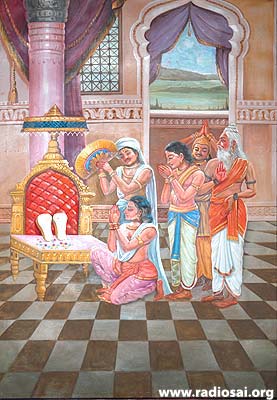 |
| "These padukas (sandals) shall rule the kingdom till your return, dear Rama" - Bharatha |
Meanwhile, Rama had established a temporary residence in the forest, and one day shortly after that, they all heard a great commotion in the distance. Climbing up a tree, Lakshmana saw Bharatha approaching with a big army behind. Hastening down he conveyed the news to Rama and then proceeded to roundly condemn Bharatha not only for being so mean as to seize the crown, but now following Rama into the forest so as to attack and kill Him. Rama, who knew Bharatha better, cut Lakshmana short and said that Bharatha was actually coming for persuading Rama to return! And so, indeed, it was.
Eyes flowing with tears, Bharatha summoned every argument he could to plead with Rama to return, but the latter was firm in His determination to adhere to Dharma. Ultimately, Bharatha had to bow to Rama's decision to remain in exile, but at the same time, he stubbornly refused to be crowned King in Rama's place. Bharatha told Rama,
"Please give me Your Padukas (sandals), and I shall crown them in Your place (PadukaPattabhisheka m). I shall stay in the village of Nandigram on the outskirts of Ayodhya and live as a hermit even as You are doing. Drawing authority from Your Padukas, I shall rule the kingdom on Your behalf during Your absence; exactly fourteen years, and not a day more. I shall be keenly awaiting Your return. If You fail to return after the stipulated period, I shall end my life" - that was the great Bharatha; a mighty empire was offered to him on a platter, but he refused to accept it.
Following the departure of Bharatha, Rama and party penetrated deep into the forest, visiting many hermitages on the way and calling on many sages. Eventually they arrived on the banks of the sacred River Godavari, built themselves a small hut and began to live in it. One day, there came near their abode, a grotesque female named Surpanakha, the sister of Ravana. Captivated by Rama's beauty, she approached Him and asked that He take her as His wife!
Being in a playful mood, Rama teased her by saying, "I am so sorry I cannot oblige you. I am already married you see, and in fact, the lady over there is My wife. Why don't you approach My brother Lakshmana? He is younger than Me, and what is more important, he is all alone, unlike Me. He would be your ideal match!" Believing what Rama said, Surpanakha approached Lakshmana and proposed to him.
Sensing Rama's game, Lakshmana decide to join the fun. "Madam," he said, "I am but a slave to my Brother. Do you want to be the wife of the Master or the slave? Just consider." Taking Lakshmana seriously, Surpanakha went back to Rama and renewed her proposal of marriage, in the process making some denigrating remarks against Sita. Rama now became angry, and deciding that the teasing was enough, ordered Lakshmana to cut off the nose and ears of Surpanakha as a punishment for her effrontery.
| |  |
| Lakshmana punishes Shurpanakha | |
Ravana Hatches His Wicked Plot
Disfigured, bleeding and screaming, Surpanakha ran to her brothers Karan and Dushan pleading that they avenge her mutilation. The brothers then went with a large army to attack Rama, but in no time at all, He annihilated the entire pack single-handed. Thwarted thus in her quest for revenge, Surpanakha then rushed to Lanka where her oldest brother Ravana was the monarch. Flinging herself at her brother's feet, she narrated her tale of woe and pleaded with Ravana to teach the Princes of Ayodhya a fitting lesson. And, as a bait, she included a captivating description of Sita's exquisite beauty.
The seeds of lust having been sown, Ravana now decided he must have Sita. To evolve a plan for achieving that, he flew to meet Maricha, his uncle. Having been chastened by his earlier encounter with Rama, Maricha was now leading a pious life, and therefore, strongly advised Ravana against any such misdeed. But drunk as he was with lustful desire, Ravana was in no mood to receive advice; becoming angry, he threatened to kill Maricha if no help was forthcoming. Preferring to die at the hands of Rama, rather than the evil Ravana, Maricha yielded.
A plan was thus hatched for the abduction of Sita. According to it, Maricha would assume the form of a golden deer, and play in the neighbourhood of Sita's abode in such a manner as to attract her attention. Wanting the deer as a pet, she would then appeal to Rama to capture it. That was when Maricha would skilfully draw Rama far away and deep into the forest. Exploiting Rama's absence, Ravana would go to the hut, grab Sita and fly away.
The plan was duly set into motion, and sure enough, Sita fell for the ploy, pleading with Rama to capture for her the golden deer. Rama cautioned that there was something weird and unnatural about the deer because there was no such thing as a golden deer in God's creation. But since Sita was adamant, Rama yielded to her wishes and went after the golden deer. However, before leaving on the chase, He took the precaution of placing Lakshmana on guard, emphatically ordering him not to leave Sita alone under any circumstances. Following the deer, Rama penetrated deep into the forest. He knew it was really Maricha in disguise, and so in order to kill him, shot an arrow. As the arrow pierced his body, Maricha fell down and imitating the voice of Rama cried, "O Sita, O Lakshmana, I am dying".
Both Sita and Lakshmana heard the cry; while Sita was fooled, Lakshmana was not. He knew that no one could kill Rama, but Sita did not have that confidence. Greatly agitated, she asked Lakshmana to go immediately and investigate. Lakshmana assured Sita that no harm could ever come to Rama, but Sita would not be convinced. Finding that Lakshmana would not budge an inch, she now became angry and accused Lakshmana of wanting Rama to die so that he could have Sita! For poor Lakshmana, these words were like daggers of fire. Unable to stand the taunts and unjust accusations, he finally went into the forest leaving Sita all alone.
Seizing the opportunity, Ravana, who was disguised as a Sannyasi or a renunciate, approached Sita as if begging for food, grabbed her, put her in his flying chariot, and flew away. Realising finally the trick that had been played on her, Sita wailed and pleaded with Ravana to let her go free; and when he refused to comply, she screamed for help.
Swami says that the inner significance of the abduction of Sita is the following: Sita represents Jiva or the embodied soul. Sita was well protected as long as her attention was focused on Rama (who stands for the Atma), but when it strayed to the golden deer (illusory worldly attraction), she got into trouble. In the same way, the Jiva will face no problems as long as it remains attached to the Atma, but if it gets tempted by the transient pleasures of the external world, then pain is inescapable.
 | | 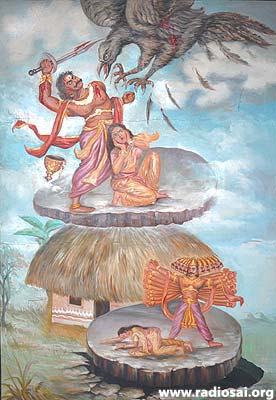 |
| Ravana in disguise as a Sannyasi (renunciate) |
| Jatayu jeopardizes its life to save Sita |
Getting back to the story, Sita’s cries for help were heard by Jatayu, the king of eagles, and an old friend of Dasaratha as well. Rushing to the rescue, Jatayu attacked Ravana fiercely, but Ravana got the upper hand and succeeded in inflicting fatal injuries on the bird. Leaving a dying Jatayu, he then, resumed his flight to Lanka. Meanwhile, tearing off a piece of her sari, Sita wrapped into it some of her jewels and threw the bundle down in the belief that Rama and Lakshmana would spot it when they went around searching for her; hopefully, the bundle would give them some clue as to the direction in which she was taken.
Back in the forest, Lakshmana caught up with Rama and discovered, as he had suspected all along, that the death cry heard earlier was a cruel fake. Surprised to see Lakshmana, Rama sternly asked him why he had left Sita alone and unprotected. Trembling with remorse, Lakshmana feebly tried to explain the extraordinary circumstances that compelled him to disobey Rama's orders. It was now patently clear that the entire episode, starting with the mysterious appearance of the strange deer, was all part of a sinister master plan. Fearing for the safety of Sita, the brothers rushed to the hut, only to find it empty.
| | 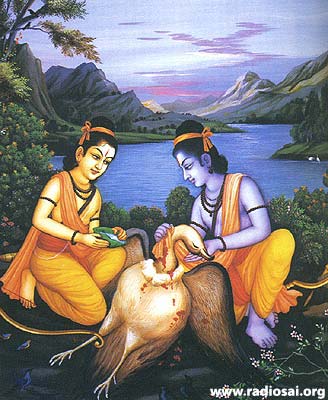 |
| Rama cared for Jatayu as He would have done for His father |
Rama's Quest to Rescue Sita
Rama now became crestfallen and inconsolably sad. (It was all play acting no doubt, but the remarkable thing is that the Lord went through every bit of it, even though He was alone in the forest with only His aide Adishesha by His side!). Lamenting the loss of Sita, the brothers then went in search of her and in the process met the dying Jatayu, who, they learnt, was a great friend of their father. Though in a feeble condition, Jatayu gave a graphic account of his attempt to rescue Sita, and then breathed his last. Rama and Lakshmana bade the bird a tearful farewell, Rama performing all the due last rites just as Jatayu's own son would have.
The brothers then moved in the general direction pointed out by Jatayu as having been taken by Ravana, and after crossing several streams, rivers, hills and dales came one day to an Ashram or hermitage once occupied by Sage Matanga. The sage was no more, but residing still in the Ashram was an old servant of his, a tribal woman named Sabari. Just before leaving for his eternal abode, Matanga told Sabari, "Wait here. One day the Lord will come and give you Darshan. After that you will be liberated."
Sabari waited patiently for that day, always keeping the pathways clean and free from thorns for she knew not when the Lord would come; and she also maintained a stock of fresh fruits and berries for entertaining the Lord when He came. Sabari had not the faintest idea of what or how the Lord would look like, and yet when Rama entered the Ashram, she immediately knew it was Him! Overjoyed she welcomed the Lord and lovingly offered the fruits she had gathered.
Sabari's devotion is an everlasting example of pure devotion of which Krishna speaks so fondly in the Gita. A simple tribal woman and totally unlettered, she knew nothing whatsoever of wisdom, meditation, and the rest of all that high-flown stuff. But, she had great love for the Lord, unselfish love, and in the end that is all that matters!
Hanuman Pledges Eternal Devotion to Lord Rama
Continuing their journey south, for that was the direction taken by Ravana, Rama and Lakshmana entered Kishkinda, the territory of the Vanaras (monkeys). Here they encountered Sugriva and Hanuman (also known as Maruti and Anjaneya). Sugriva, they learnt, was in exile having been driven out by his elder and more powerful brother Vali as the result of a misunderstanding. Vali was currently the ruler of Kishkinda but, on account of a curse, he could not enter the premises where Sugriva was hiding. In fact, as the distressed Princes were approaching, Sugriva, suspicious whether they were the agents of Vali in disguise, sent Hanuman, his loyal minister, to investigate; and that was how Hanuman first met Rama.
| | 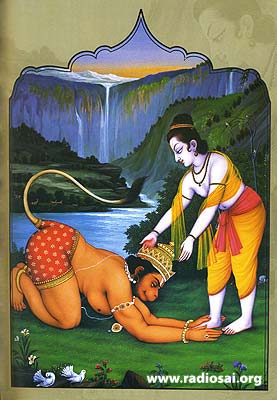 |
| Hanuman, the ideal devotee, instantly
recognizes his Master |
Hanuman's entry into the story of Rama is a bit late, but he makes up by playing a stirring and unforgettable role in the later parts. More important, he would for ever be remembered as the supreme example of a Rama Bhakta or a devotee of Rama and an ideal servant of the Lord. Of the relationship between a master and a servant, Swami says that there are three types.
The first understands precisely all that his master wants, and a mere nod is enough; no need for elaborate instructions, constant supervision, reminders, etc. The second type is a calculative one and does just what he is told; no sense of anticipation and not an iota more of service than what has been ordered. The third kind is demonic and, thinking he understands his master, does just the opposite of what he is supposed to do. Hanuman, adds Swami, belonged to the first category.
After ascertaining who they were, Hanuman conducted the Princes to Sugriva. To the latter, they explained that they were in search of Sita who had been abducted by Ravana. Listening to the sad story, Sugriva said, "O Rama, one day we saw a demon flying above in a chariot with an abducted woman. She was wailing all the time and while the chariot was flying over us, she dropped a bundle containing jewels."
Sugriva then fetched the bundle and showed the jewels. Recognising them as belonging to Sita, Rama's anguish increased, whereupon Sugriva promised all help in locating Sita and in rescuing her. Rama, in turn, promised to eliminate Vali and a friendship was sworn between the two, with fire as the witness.
Shortly thereafter, Rama killed Vali and Sugriva was installed the chief of Kishkinda. Meanwhile the rainy season intervened, and the search for Sita had to be put off till the monsoon withdrew. That happened four months later and Rama became impatient to get on with the search. However, Sugriva, who had earlier assured help, now became immersed in kingly pleasures and forgot his earlier promise. A stern reminder from Lakshmana, and Sugriva promptly became alive to his responsibilities. Four search parties of Vanaras were then organised with instructions to proceed, north, south, east and west, in search of Sita; Hanuman was in the group headed south. Eventually, Hanuman's party reached the sea coast and no sight of Sita yet. There they ran into Sampati, the brother of Jatayu, who with his distant vision told the searchers that Sita was in the far-away island of Lanka. A hundred Yojanas (one estimate is that a Yojana is about ten kilometres) separated Lanka and Bharath and the question was how to go to Lanka and continue the search.
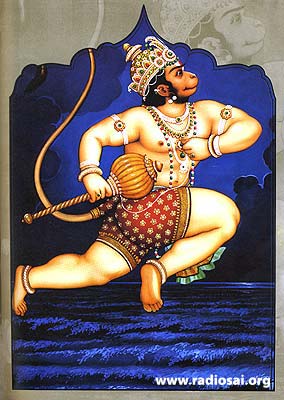 |
| The Mighty Hanuman, with the power of Almighty |
At this stage, an elderly bear in the party named Jambavan reminded Hanuman of his extraordinary abilities, and asked him to leap over the ocean to search for Sita. Accepting the responsibility, Hanuman meditated for a minute, assumed a giant form and leapt across, constantly chanting the name of Rama. En route, he ran into various obstacles, but they all vanished like the mist before the rising sun - a reminder to us that obstacles can occur even in Lord's work, but they can invariably be overcome by relying entirely on Him.
That’s all for now and more next time. Meanwhile, I do hope you enjoyed the story. With the prayer that God bless us all, I sign off now Sai Ram.
Jai Sai Ram.
(To be Continued... )

